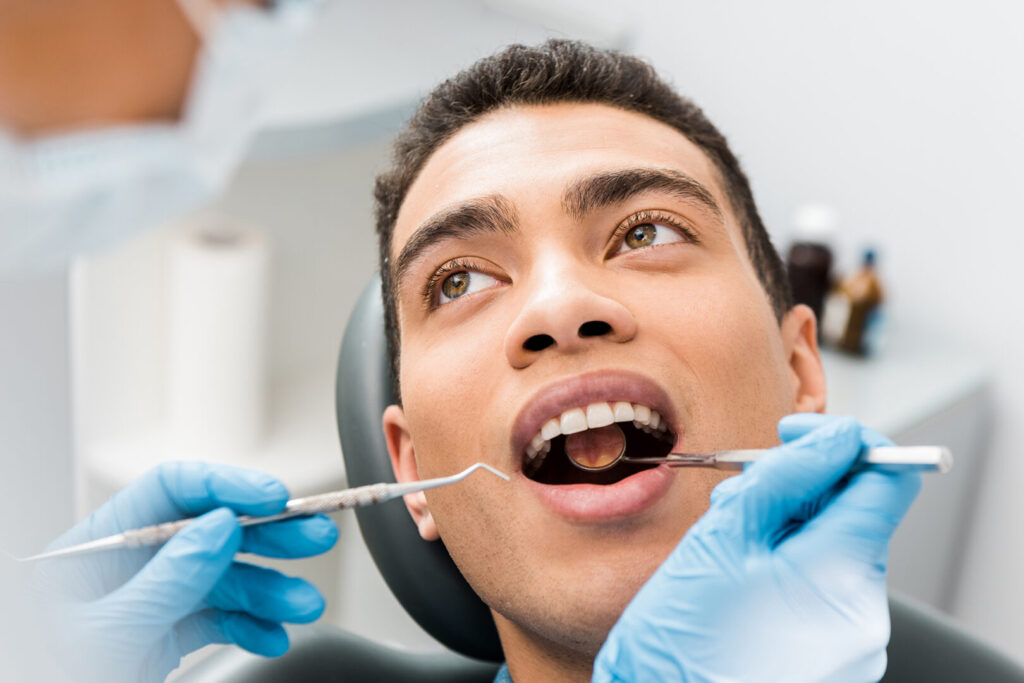Did you know there are over 700 strains of bacteria in your mouth that we keep in control through brushing, flossing, drinking water, and generating saliva? If these bacteria run rampant, they can create infections in your mouth, leading to potential health complications.
Researchers have found that oral hygiene has a direct impact on the rest of the body, and may potentially signal issues elsewhere in the body. These connections between your dental health and overall systemic physiological function have been heavily researched and proven linked. The major problem is that most patients don’t understand — or underestimate — this connection.
“Most people often don’t take notice when they read that there are so many strains of bacteria in the mouth, as they don’t think that it’s intrinsically connected to their overall health,’” says Dr Sherina Daryanani, principal dental surgeon at TEETH @ Tiong Bahru. “The reality is that bacteria and conditions in the mouth may have systemic consequences elsewhere in the body or may be indicative of larger health issues.”
Educating yourself about the association between your dental and bodily health is important to keeping you well.
How Does Dental Health Affect Overall Health: The Connection
Every part of your body has some form of bacteria, though most of it is either harmless or important to maintaining bodily functions. Your mouth is the same, except because it connects to your digestive and respiratory systems, bad bacteria in your mouth can have undesired consequences on the rest of your body.
Your body’s natural defenses, in conjunction with regular proper dental and oral health care, like brushing and flossing, should be enough to keep the bacteria in line. If dental care is neglected, these bacteria can run rampant, leading to oral infections like gum disease or tooth decay.

Additionally, an important part of your natural defenses is saliva flow. Some medications, like antidepressants, painkillers, antihistamines, decongestants, and diuretics, can affect this. Your saliva is critical because it helps neutralise the acids created by bacteria in your mouth and prevent bad bacteria from multiplying and leading to infection.
What’s happening in the mouth can contribute to conditions elsewhere in the body:
- Gum Infections and brain disorders: Research suggests that dental health deteriorates as Alzheimer’s disease advances in individual patients. Some cases have shown that infections in the gum connect to inflammations in the brain, potentially causing Alzheimer’s disease.
- Dental health and heart disease: One common condition that is caused by an oral infection is endocardium, when the inner lining of your heart chambers becomes infected. This is because the infection spreads from the mouth into the bloodstream, eventually reaching your heart. Research has found that patients with gum disease have an increased chance of stroke or heart disease, likely for this exact reason.
- Periodontal disease and diabetes: Diabetes substantially impairs your body’s ability to resist infection. As such, gum disease is often found in patients with diabetes and tends to have worse effects. This leads to a vicious cycle, where your mouth continually gets infected, leading to complications elsewhere in the body, while diabetes inhibits your body’s ability to react. Regular periodontal dental health care has been shown to help patients with diabetes and take some strain off their bodies. and reduce the risk to important organs like the eyes, heart, feet and kidneys.
There are other conditions that can affect your dental health, like rheumatoid arthritis, certain cancers, eating disorders, and Sjogren’s syndrome, an immune system disorder that dries out your mouth.
It’s important you let your dentist know what medications you are currently taking and about any other changes in your overall health. This way, they can best ascertain what type of treatment you need and what risk factors are at play.
Importance of Dental Health for Women
The bacteria levels in the mouth are affected by hormonal changes in the body. As such, women at different stages of their lives are at risk of developing different issues due to poor dental health. For example, when a woman first starts menstruating, there is a chance of experiencing mouth sores or swollen gums during her periods as the body’s hormonal levels adjust.

For this same reason, women who are pregnant need to practice good oral health. Pregnancy leads to a spike in progesterone and other hormones, which alter the body’s normal balance. Additionally, morning sickness can alter the bacteria content of your mouth and lead to acid dissolving the tooth enamel. All of these together can result in gingivitis, an abnormal amount of saliva, or granulomas, a type of benign growth on the gums.
Periodontal disease, an infection of the gums, also increases the chances of premature birth, leading to low birth weight for the child. Let your dentist know if you’re pregnant, so they can give you a catered treatment and keep your mouth healthy.
Periodontal disease is also more frequent in women who have reached menopause, as estrogen deficiency alters the body’s hormonal levels. This can also lead to burning mouth syndrome, a disorder where the mouth experiences an uncomfortable tingling sensation and sometimes changes taste perception. Both periodontal disease and burning mouth syndrome can be treated by your dentist with creams, lozenges, oral medication, or a dedicated cleaning.
As with most diseases, prevention is far better than treatment. Practice good oral hygiene and consult your general dental clinic if you have any concerns.
Periodontal Disease in Men
Statistically, men seem to be less disciplined about dental and oral health than women. The American Academy of Periodontology found that men are less likely to practice regular oral hygiene and seek preventative dental health care.
The effects of periodontal disease are different for men than women. Men under 30 or over 70 have a higher chance of developing impotence if they have periodontal disease. Research suggests that the inflammation of the gums and oral infection can damage blood vessels, potentially causing impotence.

Research has also found that prostate health may be connected to periodontal health and vice versa. A specific enzyme produced by the prostate called Prostate-specific antigen (PSA) exists in the body in small amounts. If the prostate is inflamed, infected, or afflicted by cancer, PSA levels in the body increase. Studies have found that men with periodontal disease and inflamed prostates have higher levels of PSA than men with only one of either condition. This could possibly explain why periodontal disease is higher in men (56.4%) than in women (38.4%).
Men have a higher risk of developing heart disease than women. Research shows that periodontal disease and cardiovascular disease are connected. This means that for men, maintaining periodontal disease is important to stave off heart conditions. Both conditions are chronic inflammatory conditions, and researchers believe that inflammation connects periodontal disease and heart disease.
Men are also more at risk for oral or throat cancer than women. Men with a history of periodontal disease are 13 percent more likely to develop oral cancer than men with healthy gums. [1] It’s important for men to understand the potential ramifications of poor dental health and start building better oral hygiene habits.
Benefits of Preventative Dental Check-Ups
To most people’s surprise, dental health can be an important factor in overall health, wellbeing, and quality of life. There are many different diseases or conditions that can affect the mouth, like gum disease, tooth loss, oral cancer, and dental caries.

Oral health problems can potentially lead to infections, causing complications elsewhere in the body, like infections, heart disease, and increased risk of diabetes or cancer. Maintaining good oral hygiene is a simple step to reduce your chances of these diseases by avoiding tooth decay or gum disease. And if prevention doesn’t work, it is critical that you get your teeth and gums treated to avoid difficult infections.
One easy way to do so is to visit your dentist regularly. Your dentist can help identify and treat problems in their early stages, before they develop into something serious. Schedule an appointment with us at TEETH @ Tiong Bahru for your routine dental check-up in Singapore.
____________________
Sources
[1] Michaud DS, Kelsey KT, Papathanasiou E, Genco CA, Giovannucci E. Periodontal disease and risk of all cancers among male never smokers: an updated analysis of the Health Professionals Follow-up Study. Ann Oncol. 2016 May;27(5):941-7. doi: 10.1093/annonc/mdw028. Epub 2016 Jan 24. PMID: 26811350; PMCID: PMC4843185.







